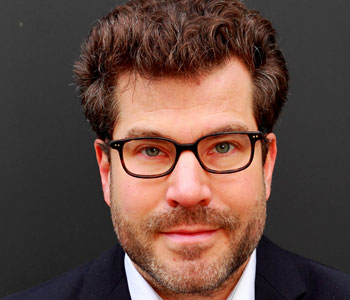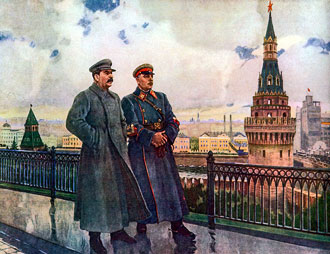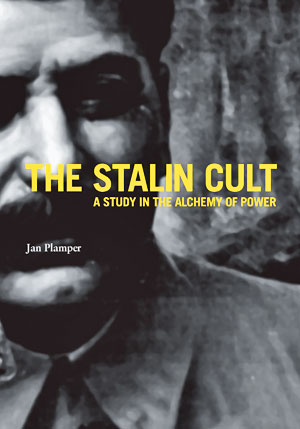
This book is about Joseph Stalin’s personality cult—where it came from, how it changed over time, and how it was made. In spite of its subject matter, I hope the reader will find the book also beautiful—it focuses on visual culture and has a lot of pictures.
The Stalin Cult begins by defining a modern personality cult, at the most basic level, as the symbolic elevation of one person much above others.
Modern personality cults, starting with Napoleon III’s, shared a number of common features. They were secular; the leader was venerated, not as a divinely appointed monarch, but as the embodiment of the will of the people. The cultic objects were always male. The intended audience was the masses, who were targeted via mass media. And finally, they thrived only in closed societies, within which media-transmitted criticism or the introduction of a rival cult was impossible.
Rather than viewing the Stalin cult as a product of Stalin’s psychopathology or eternal Russian mysticism-cum-authoritarianism, the book then makes a historical argument about its genesis, highlighting a host of factors, both general (e.g. the sacralization of man in the wake of the Enlightenment) and Russian (e.g. a tsarist “carryover”). The book next traces the evolution of Stalin’s visual image in the newspaper Pravda across time. Subsequently, I analyze a socialist realist painting, Aleksandr Gerasimov’s Stalin and Voroshilov in the Kremlin (1938), focusing on its spatial organization in concentric circles.
The rest of the book is devoted to the making and reception of the cult. It shows that—because of official embarrassment about the cult of an individual in a collectivist polity—there was no central Stalin cult institution (a Stalin cult ministry or some such). Rather, many personal and institutional actors together produced the cult. They formed a multifocal nexus which functioned autonomously—and Stalin could always cut across all established lines of command.
How did common people actually make sense of the cult? Rather than pursuing the Holy Grail of “reception,” I reconstruct the ways in which cult producers ascertained the public’s reactions to a Stalin cult product, and how these reactions figured in the processes of cult production.
Finally, a word about the alchemy metaphor. I see that metaphor operating at two levels. On the one hand it describes the elevation of Stalin above his compatriots, how he was transformed from a pockmarked Georgian into the embodiment of global communism: the processes through which the various elements of the cult were chosen, combined, and interacted. Key to the alchemical process is the assumption that the end result is a sum that amounts to more than its parts—in other words, a surplus. Stalin’s elevation, his larger than-life presence, is precisely this kind of surplus. On the other hand alchemy also signifies a surplus of the unknowable—this second sense became increasingly important the deeper I looked into the cult.

The Stalin Cult crosses disciplinary boundaries: it is both history and art history and it speaks to the fields of symbolic politics, the high politics of Stalinism, socialist realist visual studies, and dictator biography. I hope the book wears its theory lightly, but, undeniably, I was influenced by the new cultural history, by practice studies in the vein of Pierre Bourdieu, and by the social history of art. I also hope that the book’s empirical core will stand the test of time—this is the first book to reconstruct how the Stalin cult was made.
Soviet citizens encountered not Stalin, the person, but Stalin, the cult product. Consider this story that Artyom Sergeev, Stalin’s adopted son, was fond of telling. He recalled a fight between Stalin and his biological son Vasily. After Stalin found out that Vasily had used his famous last name to escape punishment for one of his drunken debauches, Stalin screamed at him. “‘But I’m a Stalin too,’ retorted Vasily. ‘No, you’re not,’ said Stalin. ‘You’re not Stalin and I’m not Stalin. Stalin is Soviet power. Stalin is what he is in the newspapers and the portraits, not you, not even me!’”
Socialist realism was arguably the 20th century’s most successful artistic phenomenon, especially if measured in terms of quantitative output and geographical reach. Yet socialist realism remains notoriously difficult to define. Scholars can’t seem to agree if it was a style or a set of doctrines, art or propaganda.
I submit that socialist realism was inherently instable and its expressive registry the result of historically variable practices. A great entryway into socialist realism thus defined is a 1949 discussion of a socialist realist painting-in-progress at an institution called “art soviet.” At this discussion a senior painter named Plastov commented on a socialist realist portrait, V. I. Lenin’s Funeral on Red Square, by Yerushev, who was present. Plastov’s comments come as close to an elaboration of the principles of socialist realism in situ as one will find.
Here’s an excerpt from the pages 187-188:
Plastov: Comrade Yerushev, what happened on that woeful day? The leader died, next to him stands another leader, Stalin, stand comrades, comrades-in-arms, soldiers, stands the entire Russian people. . . . And how are you solving this question? You are solving it, it seems to me, without an understanding of the moment and the faces that you are depicting. How are you composing? In the foreground, you devote one-third of the composition to the most motionless [element] in the composition—the balustrade, the branches, the smoke, etc. The main, key elements—Stalin, Kalinin, Dzerzhinsky, and other comrades-in-arms of Lenin—cannot be seen. . . . It is confusing. Then you begin searching—who is standing there? That is probably Stalin—yes, it is him. . . . And altogether you get neither the people, nor the atmosphere in which this is taking place, nor the people behind these leaders, nor the leaders in front of the people. . . . Furthermore, regarding the psychology of those present: Stalin’s face should express the sorrow of a great man about a genius who has passed away, and how have you expressed this? You have not. All we see is a man with a lowered head, and so forth. . . . Do keep in mind that you have chosen an exceptional moment in the history of the country, in the history of mankind, and all of a sudden you approach this moment somewhat mechanically. I do not think this is right.
Yerushev’s subject was a moment of truly mythic proportions in the history of the first socialist society: the transfer of power from the founding leader Lenin to his successor Stalin. To depict this crucial moment, realism as the style of choice was never in doubt. Yet this realism should move beyond mimesis. The task of this kind of realism—socialist realism—was to express on canvas a time characterized as kairos rather than chronos. A depiction of Lenin’s funeral had to show more than just Lenin’s funeral. It had to show not just history as it was, but history as it ought to be and indeed would be. It had to give an inkling of a place mankind had not yet been to but was inexorably moving towards—utopia.
The Russian translation of the book appeared in early 2010 when Moscow mayor Luzhkov had agreed to a veterans organization’s demand to carry, for the first time in decades, Stalin portraits during the annual May 9 celebrations of the Soviet victory over Nazi Germany. Luzhkov’s decision reignited public debates about Stalinism, in which the Kremlin appeared more anti-Stalinist than in previous years. (In retrospect, the Kremlin probably merely used the Stalin poster scandal to sack Luzhkov, which it did during the summer.)
At the height of this scandal, the book earned me an invitation to Pust govoryat—a Russian talk show in the Jerry Springer style (that translates “Let them talk”). I declined the invitation, but the book had become a political argument. Russian democrats used it to assail Stalin’s legacy, going so far as to warn about post-Soviet image politics drifting into a personality cult (recall Putin’s bare torso photo op on the Yenisei or Putin shooting a Siberian tiger with a tranquilizer gun). Russian nationalists accused me of foreign intervention; one blogger suggested that “the Fritz”—apparently, me—“better go and study his Hitler.”
I had never expected the book would have this kind of relevance to contemporary politics. However, if The Stalin Cult helps to uncover the mechanics of personality cults and makes it a bit more difficult for, say, a pseudo-popular initiative to rename a mountain after Putin (after some staged reluctance from him), that’s not too bad.


Jan Plamper is currently Dilthey Fellow at the Max Planck Institute for Human Development in Berlin and will become a Professor of History at Goldsmiths, University of London later this year (2012). He holds a B.A. from Brandeis University and a Ph.D. from UC Berkeley. Besides The Stalin Cult, featured on Rorotoko, Plamper is the author of Geschichte und Gefühl (forthcoming in English as History and Feeling) and, with Benjamin Lazier, coeditor of Fear: Across the Disciplines. He is now working on the history of fear among soldiers during the First World War.